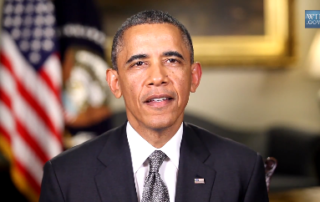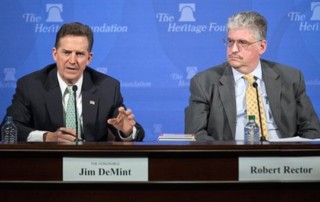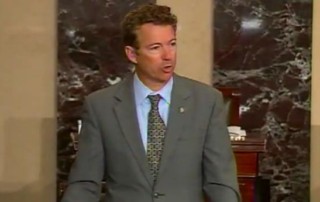Rick Santelli liked our paper
Here’s CNBC’s Rick Santelli interviewing Ed Lazear on our new paper.
[gigya src=”http://plus.cnbc.com/rssvideosearch/action/player/id/3000197451/code/cnbcplayershare” width=”400″ height=”380″ quality=”high” wmode=”transparent” allowFullScreen=”true” ]Observations on the Financial Crisis
For the five year anniversary of the 2008 financial crisis, Ed Lazear and I have released a paper titled “Observations on the Financial Crisis,” published through the Hoover Institution. It’s just over 25 pages and also has a fairly detailed timeline of events as an appendix.
Ed was chairman of President Bush’s Council of Economic Advisers when I was director of the National Economic Council.
Here are the 19 observation headlines. I urge you to read our supporting arguments, especially if you’re going to comment on or respond to them. Each argument takes only about a page.
- “The recession that began in late 2007” conflates two distinct time frames.
- The financial panic began in September 2008. The financial crisis began long before, and first showed significant signs in August 2007.
- The shock and panic of September 2008 were triggered by a sequence of events, not just by the Lehman failure.
- Putting Fannie Mae and Freddie Mac into conservatorship likely averted larger shocks.
- The “deregulatory cause” hypothesis is flawed.
- The financial crisis was caused principally by unprecedented capital flows into the United States.
- Dominoes vs. popcorn
- TARP was a shift to a systemic solution from a case-by-case approach and was possible only when Congress accepted that inaction would lead to a catastrophic failure. Policy makers traded false negative errors for false positive errors.
- TARP is the most successful financial policy for which no member of Congress will admit having voted “aye.”
- Capital investment was indeed better policy than buying “toxic assets.”
- The financial crisis was largely resolved by the time President Obama took office in late January 2009. President Obama’s task was not to address the financial crisis, but instead to handle the ensuing financial cleanup, financial policy reforms, and the severe macroeconomic recession that resulted from the late-2008 financial crisis.
- The financial rescue continuity should not be surprising, since two of the three key players were unchanged.
- Some conservatives mistakenly assumed that Chapter 11 restructuring was a viable option for GM and Chrysler.
- President Bush’s decision to extend auto loans was in part influenced by the timing of the Presidential transition.
- While both were heavily involved in crisis management, Presidents Bush and Obama took different approaches to firm-level decisions.
- “The deepest recession since the Great Depression” does not mean the two are comparable in size.
- At best, the fiscal stimulus offset about a quarter of lost output in the past five years.
- The exceptionally slow recovery has magnified the economic losses of the 2008-09 recession.
- While the U.S. economy is growing, it is not returning quickly to its prior level.
If you find this paper interesting I have two other reading suggestions to offer.
- As a member of the Financial Crisis Inquiry Commission I wrote a dissent to the main report with Bill Thomas and Doug Holtz-Eakin. Where the Hennessey/Lazear paper makes a collection of arguments on frequently discussed topics about the crisis, the Hennessey/Holtz-Eakin/Thomas dissent attempts to describe the causes of the 2008 crisis.
- I think this paper by Brookings’ Martin Baily and Doug Elliott, Telling the Narrative of the Financial Crisis, does the best job of framing the overall debate about what caused the 2008 crisis. At a minimum it’s good to read their short blog post about the paper. The Financial Crisis Inquiry Commission debate fit perfectly into these three narratives: the majority report tracked Narrative 2, Peter Wallison’s dissent tracked Narrative 1, and our dissent tracked Narrative 3 (where Baily and Elliott are).
Two sharp-eyed readers (who are better than I am at proofreading) found our typo. On page 2 it should read “… steadily worsening to 830,000 jobs lost in March of 2009.” The printed text says March of 2008.
Sorry, Heritage, your number is still wrong
I’d like to thank the Heritage Foundation for taking the time and effort to respond to my post, “Eight problems with the Heritage immigration cost estimate.” Heritage’s response, written by Derrick Morgan, is professional and takes a constructive tone. I still disagree with their conclusion, but I appreciate their efforts to make this a discussion rather than the usual screaming matches one finds online.
I’m not sure it adds a lot of value for me to go point-by-point rebutting each of Mr. Morgan’s responses to my original technical points. He is right that we agree in some areas, even though he doesn’t highlight all areas of our agreement. I am sorry to say that where we still disagree his responses have not convinced me to change my original critiques.
While I therefore stand by each point of my original critique, I think it’s most helpful if I highlight a few points on which we agree, and then explain again only the most important reasons why I continue to recommend policymakers ignore this study and its headline number.
Boasting about a 4.2% deficit?
Here’s President Obama in his weekly address on Saturday:
In a little over three years, our businesses have created more than 6.5 million new jobs.
… Corporate profits have skyrocketed to all-time highs.
… Our housing market is healing.
… And our deficits are shrinking at the fastest rate in decades.
If you studied my post last Wednesday on the CBO baseline update, this should strike you as an odd boast.
CBO projects that under current law we would have a deficit of 4% of GDP for 2013, meaning that our debt/GDP will continue to rise. CBO further projects that under the President’s budget we would have a deficit of 4.2% of GDP for 2013, slightly higher than their projected deficit under current law.
President Obama’s words: Our deficits are shrinking at the fastest rate in decades.
Translation 1: The rate at which we’re rolling backwards is slowing dramatically.
or Translation 2: Our debt problem is getting worse much more slowly than in recent years.
That is not something you should boast about. You’re supposed to boast when things are getting better, not when they’re getting worse more slowly.
A mistake in my deficit post
I made a mistake in my Wednesday post about CBO’s new deficit projection. I simply misread (and then misreported) CBO’s explanation of why their revenue projection increased.
CBO projects that revenues will increase significantly from last year (2012) to this year (2013) for three reasons:
- The tax increases legislated in the January 2nd “fiscal cliff” law;
- Some taxpayers realized their income in late 2012 rather than 2013 in anticipation of 2013 rate increases;
- For other reasons, personal income increased from 2012 to 2013.
These are all reasons why the U.S. Government is projected to collect significantly more revenues in 2013 than it did in 2012. In my earlier post I had mistakenly said these were reasons why CBO’s most recent baseline update had increased from January/February until now.
CBO’s Jan/Feb baseline document (and, indeed, their August baseline update last summer) had already incorporated tax increases scheduled to occur under then-current law. CBO did not leave them out of their Jan/Feb projection as I wrote earlier.
CBO’s revenue projection increased from their Jan/Feb baseline document to now simply because they have increased their estimate of the magnitude of the second factor listed above.
I apologize for any confusion I caused. While it’s important that I correct this, the error and correction don’t change the fundamental lessons from that post.
You can see the corrected post here. Thanks to a friend for pointing out my mistake.
CBO’s new deficit estimate
Update: In the original version of this post I erred in explaining why CBO increased their revenue projection. I simply misread the CBO document. A fuller explanation of my error is here. Corrections are in green below.
CBO released their updated economic and budget baseline today, in advance of their estimate of the President’s budget due out later this week. At first the headline sounds like good news: the deficit for this year will be “only” $642 B, 4% of GDP. That’s about $200 B smaller than CBO projected for this year in their January baseline document. Should we celebrate?
No, not unless you like the “fiscal cliff” tax rate increases and you like the government owning Fannie Mae and Freddie Mac. Those are the reasons why the deficit projection declined.
Deficits and Debt
You should know three benchmarks when thinking about federal budget deficits, each measured in % of GDP:
- A roughly 3% deficit will hold debt/GDP constant;
- The historic average deficit (pre-2008 crisis) is about 2% of GDP; and
- Of course, a balanced budget is zero deficit.
Any time you hear a deficit number, compare it to zero, two and three, and you’ll have a good feel for where we are. A 4 percent deficit for this year is not good: it’s almost twice as high as the historic average, and it’s high enough that our debt will continue to increase faster than our economy will grow.
You will hear “But that 4 percent projection is much lower than the 5.4% projected in January. Surely that’s good news. It is certainly an improvement over where we thought we were this year.”
This is where we need to review levels, rates of change, and expectations. This is tricky so I’ll break it down into small steps.
Eight problems with the Heritage immigration cost estimate
On Monday the Heritage Foundation released a paper, The Fiscal Cost of Unlawful Immigrants and Amnesty to the U.S. Taxpayer. Along with Heritage’s new director Jim DeMint, the study’s senior author, Robert Rector, also published a Washington Post op-ed titled, “What amnesty for illegal immigrants will cost America.”
The key substantive point of the paper and op-ed is a $6.3 trillion number:
An exhaustive study by the Heritage Foundation has found that after amnesty, current unlawful immigrants would receive $9.4 trillion in government benefits and services and pay more than $3 trillion in taxes over their lifetimes. That leaves a net fiscal deficit (benefits minus taxes) of $6.3 trillion.
I expect making 8-9 million people here illegally into U.S. citizens would increase future deficits once these people are eligible for benefits. But there are so many problems with the Heritage study that this $6.3 trillion number is useless for making policy decisions. It might as well be plucked out of thin air.
Others have criticized the Heritage study, including a detailed critique from Cato’s Alex Nowrasteh. I’m adding to that here.
Opposing the President’s FHFA nomination
Today President Obama announced his intent to nominate Rep. Mel Watt (D-NC) to head the Federal Housing Finance Authority (FHFA), the regulatory agency that regulates Fannie Mae and Freddie Mac.
In the mid 2000s Fannie, Freddie, and their hordes of lobbyists were able to delay GSE reform legislation until it was too late to do any preventive good. Despite the efforts of President Bush to push aggressive reforms for several years prior, legislation was enacted only in July 2008 as the firms were in the process of imploding. Congress allowed the barn doors to be closed only after the horses had escaped.
For GSE reformers the most important vote was on a bipartisan May 2007 House floor amendment by Rep. Randy Neugebauer (R-TX) and Rep. Melissa Bean (D-IL).
At the time Fannie and Freddie held portfolios of mortgage-backed financial assets of about $700 billion (each!) GSE reformers were afraid that these large hedge funds within the firms were carrying too much risk and had little to do with the core mission for which Fannie and Freddie were created. Because Fannie and Freddie (a) were so big, (b) held such huge portfolios with poorly-understood risk; and (c) were interconnected with so many other financial firms large and small, reformers feared they posed too much risk to the financial system.
George W. Bush is smarter than you
The new George W. Bush Presidential Center is being dedicated this week. This seems like a good time to bust a longstanding myth about our former President, my former boss.
I teach a class at Stanford Business School titled “Financial Crises in the U.S. and Europe.” During one class session while explaining the events of September 2008, I kept referring to the efforts of the threesome of Hank Paulson, Ben Bernanke, and Tim Geithner, who were joined at the hip in dealing with firm-specific problems as they arose.
One of my students asked “How involved was President Bush with what was going on?” I smiled and responded, “What you really mean is, ‘Was President Bush smart enough to understand what was going on,’ right?”
The class went dead silent. Everyone knew that this was the true meaning of the question. Kudos to that student for asking the hard question and for framing it so politely. I had stripped away that decorum and exposed the raw nerve.
I looked hard at the 60 MBA students and said “President Bush is smarter than almost every one of you.”
More silence.
I could tell they were waiting for me to break the tension, laugh, and admit I was joking.
I did not. A few shifted in their seats, then I launched into a longer answer. While it was a while ago, here is an amalgam of that answer and others I have given in similar contexts.
I am not kidding. You are quite an intelligent group. Don’t take it personally, but President Bush is smarter than almost every one of you. Were he a student here today, he would consistently get “HP” (High Pass) grades without having to work hard, and he’d get an “H” (High, the top grade) in any class where he wanted to put in the effort.
For more than six years it was my job to help educate President Bush about complex economic policy issues and to get decisions from him on impossibly hard policy choices. In meetings and in the briefing materials we gave him in advance we covered issues in far more depth than I have been discussing with you this quarter because we needed to do so for him to make decisions.
President Bush is extremely smart by any traditional standard. He’s highly analytical and was incredibly quick to be able to discern the core question he needed to answer. It was occasionally a little embarrassing when he would jump ahead of one of his Cabinet secretaries in a policy discussion and the advisor would struggle to catch up. He would sometimes force us to accelerate through policy presentations because he so quickly grasped what we were presenting.
I use words like briefing and presentation to describe our policy meetings with him, but those are inaccurate. Every meeting was a dialogue, and you had to be ready at all times to be grilled by him and to defend both your analysis and your recommendation. That was scary.
We treat Presidential speeches as if they are written by speechwriters, then handed to the President for delivery. If I could show you one experience from my time working for President Bush, it would be an editing session in the Oval with him and his speechwriters. You think that me cold-calling you is nerve-wracking? Try defending a sentence you inserted into a draft speech, with President Bush pouncing on the slightest weakness in your argument or your word choice.
In addition to his analytical speed, what most impressed me were his memory and his substantive breadth. We would sometimes have to brief him on an issue that we had last discussed with him weeks or even months before. He would remember small facts and arguments from the prior briefing and get impatient with us when we were rehashing things we had told him long ago.
And while my job involved juggling a lot of balls, I only had to worry about economic issues. In addition to all of those, at any given point in time he was making enormous decisions on Iraq and Afghanistan, on hunting al Qaeda and keeping America safe. He was making choices not just on taxes and spending and trade and energy and climate and health care and agriculture and Social Security and Medicare, but also on education and immigration, on crime and justice issues, on environmental policy and social policy and politics. Being able to handle such substantive breadth and depth, on such huge decisions, in parallel, requires not just enormous strength of character but tremendous intellectual power. President Bush has both.
On one particularly thorny policy issue on which his advisors had strong and deep disagreements, over the course of two weeks we (his senior advisors) held a series of three 90-minute meetings with the President. Shortly after the third meeting we asked for his OK to do a fourth. He said, “How about rather than doing another meeting on this, I instead tell you now what each person will say.” He then ran through half a dozen of his advisors by name and precisely detailed each one’s arguments and pointed out their flaws. (Needless to say there was no fourth meeting.)
Every prominent politician has a public caricature, one drawn initially by late-night comedy joke writers and shaped heavily by the press and one’s political opponents. The caricature of President Bush is that of a good ol’ boy from Texas who is principled and tough, but just not that bright.
That caricature was reinforced by several factors:
<
ul>
I assume that some who read this will react automatically with disbelief and sarcasm. They think they know that President Bush is unintelligent because, after all, everyone knows that. They will assume that I am wrong, or blinded by loyalty, or lying. They are certain that they are smarter than George Bush.
I ask you simply to consider the possibility that I’m right, that he is smarter than you.
If you can, find someone who has interacted directly with him outside the public spotlight. Ask that person about President Bush’s intellect. I am confident you will hear what I heard dozens of times from CEOs after they met with him: “Gosh, I had no idea he was that smart.”
At a minimum I hope you will test your own assumptions and thinking about our former President. I offer a few questions to help that process.
- Upon what do you base your view of President Bush’s intellect? How much is it shaped by the conventional wisdom about him? How much by verbal miscues highlighted by the press?
- Do you discount your estimate of his intellect because he’s from Texas or because of his accent? Because he’s an athlete and a ranch owner? Because he never advertises that he went to Yale and Harvard?
- This is a hard one, for liberals only. Do you assume that he is unintelligent because he made policy choices with which you disagree? If so, your logic may be backwards. “I disagree with choice X that President Bush made. No intelligent person could conclude X, therefore President Bush is unintelligent.” Might it be possible that an intelligent, thoughtful conservative with different values and priorities than your own might have reached a different conclusion than you? Do you really think your policy views derive only from your intellect?
And finally, if you base your view of President Bush’s intellect on a public image and caricature shaped by late night comedians, op-ed writers, TV pundits, and Twitter, is that a smart thing for you to do?
(photo: The Bush Center)
How filibusters work and why they are so rare
Last night Senator Rand Paul from Kentucky led a 13-hour filibuster of the nomination of John Brennan to head the CIA. Based on a couple questions from friends I’d like to explain how a filibuster works and why they are so rare.
Background
At almost any point in time the Senate is technically either debating or voting on a yes or no question. Typical questions the Senate considers look like this:
- Should amendment A by Senator B to bill C be adopted?
- Should the Senate pass bill C?
- Should the Senate consent to the nomination of person D to job E?
- [Now that it has finished F,] Should the Senate next proceed to working on G?
Most questions the Senate considers are debatable. This means that any of 100 Senators, or all of them, can speak about the question for as long as he or she wants.
A few types of questions are non-debatable. As soon as the question is asked, the Senate immediately proceeds to vote on the question. Nominations are debatable questions.
There’s a middle ground as well, used mostly for two types of fiscal policy legislation. The Senate has a fixed amount of total time to debate a budget resolution or a budget reconciliation bill.




